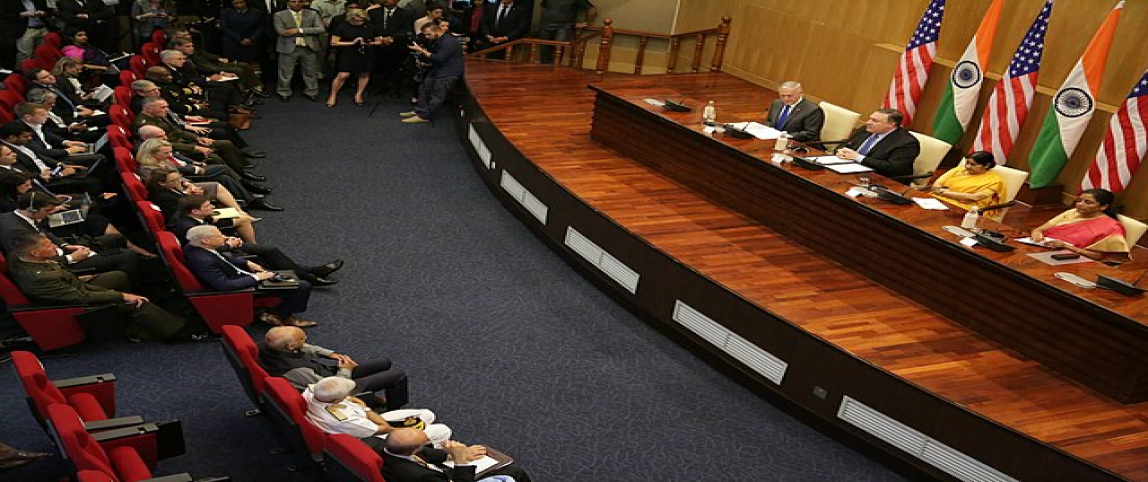India and the United States, known for their recent strategic partnership, find themselves at odds over the issue of elections and democratic practices in Bangladesh.
The discord appears to have widened following the 2+2 dialogue held in Delhi on November 10.
During the dialogue, US Secretary of State Anthony Blinken and Defense Minister Lloyd Austin met face-to-face with their Indian counterparts, S Jaishankar and Rajnath Singh.
Analysts and observers closely monitoring India-US diplomacy revealed that India distinctly disagrees with the US assessment and actions regarding the situation in Bangladesh.
The aftermath of the challenging experience in Afghanistan has prompted India to emphasize its stance against unilateral actions by the US in another South Asian country.
Former Indian diplomat Gurjit Singh pointed out the stark disagreement between India and the US on the Bangladesh issue.
He said: “'It is now clear where the main disagreement between the two countries is. India prioritizes political stability in Bangladesh while the US aims to ensure flawless elections, even contemplating punitive actions to achieve this goal.”
Gurjit Singh argued that India fears such efforts could backfire, leading to a turbulent and violent situation in Bangladesh.
He emphasized that maintaining political stability takes precedence over unsettling elections, a viewpoint India is keen on conveying to the US.
Notably, the joint statement released after the 2+2 dialogue on November 10 made no mention of Bangladesh, indicating a lack of agreement on the issue.
Foreign Secretary Vinay Mohan Kwatra, however, clarified India's position in a subsequent press conference. He emphasized that Bangladesh's elections are its internal matter, and India, as an ally and partner, respects the democratic process, supporting Bangladesh's vision for stability, peace, and progress.
Incidentally, just the previous day, on November 9, the spokesperson of the Indian Ministry of External Affairs, Arindam Bagchi, said exactly the same thing in response to a question about Bangladesh.
Diplomatic analyst Shashank Mattu sees Kwatra's comments as evidence that India is ready to confront the US on the Bangladesh issue.
Shashank Mattu points out the significance of India explicitly raising the issue after the dialogue, terming it a clear conflict between the two nations.
“See, because the two countries could not agree on one issue, it did not make it into the joint statement. However, after the meeting, India said that it had raised the issue. Even so, exactly what was said was also reported. As a result, it can be called nothing but a conflict between the two parties,” he explained.
Mattu, who is also a former fellow of the think tank Observer Research Foundation (ORF), underscored three crucial words in India's stance - stable, peaceful, and progressive, signifying India's concern about avoiding unrest, violence, and radicalization in Bangladesh.
He suggested that India fears these outcomes may arise from America's proactive approach.
Gurjit Singh also offered a very interesting insight into India's apprehension, citing historical examples where unilateral actions by the US in South Asia, such as the withdrawal from Afghanistan, yielded unfavorable results.
The former envoy suggested that according to his old sources at the ministry, India has warned the US, using the Afghanistan example, cautioning against unilateral actions in Bangladesh that may lead both nations to regret their decisions later.
Some Indian observers speculate that the US may reconsider its position in light of India's firm stance on the Bangladesh issue.
Pankaj Saran, former Indian high commissioner in Dhaka, said that the US cannot easily dismiss India's views.
He believes that Washington must take into account the statement of its most important partner in the region, especially on any issue related to South Asia.
Pinak Ranjan Chakraborty, another former Indian high commissioner to Bangladesh, suggests that the US is likely to review its Bangladesh policy over time, acknowledging India's strong position.
“But it won't happen overnight, it will take time,” he said.
The former envoy also recalled that the US has always had a soft attitude towards the BNP in Bangladesh since the time of late president Ziaur Rahman’s regime.
“At the moment, there is no doubt that Delhi and Washington's assessments and perspectives on the election and political situation in Bangladesh are completely different,” he added.
(This article was first published by Dhaka Tribune, Bangladesh)
















